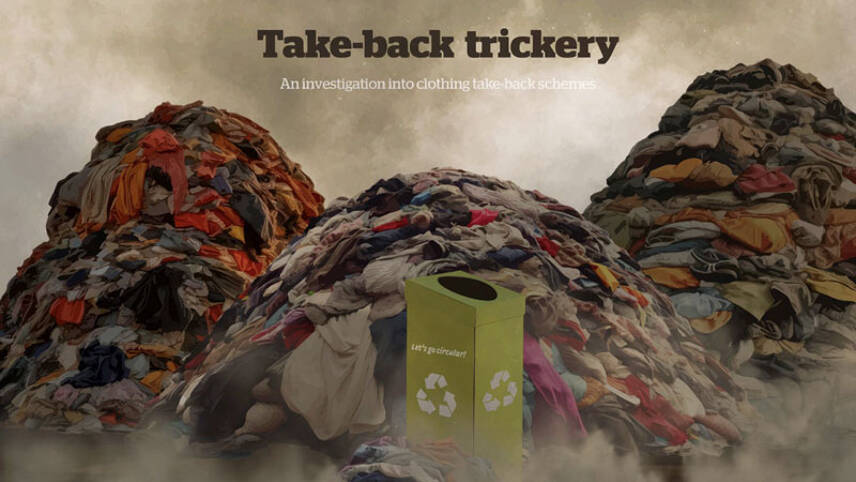Register for free and continue reading
Join our growing army of changemakers and get unlimited access to our premium content

The Changing Markets Foundation conducted the investigation, planting AirTags in 21 garments before donating them to big-name fashion retailers in the UK, Belgium, France and Germany. All of the items were in new condition. Most were donated in-store and a minority were posted to Boohoo in the UK.
Brand donation schemes used were H&M, Boohoo, Zara, C&A, Primark, Nike, The North Face, Uniqlo and Marks & Spencer (M&S)
Of the items donated in the UK, three-quarters were tracked to shredding, landfill or burning sites – or they were exported to Africa. The African market is over-saturated with used clothing and the Foundation estimates that half of imported used clothes do not get reused or recycled into new garments.
A skirt donated in H&M in the UK ended up at a waste site in Mali. A pair of trousers donated to M&S were kept within Europe, but shredded nonetheless. Only one-fifth of the donations made in the UK were reused or resold in Europe.
The Foundation acknowledges that the final responsibility for garments collected in retailer take-back schemes typically sits with third-party resellers or waste management firms. But it is calling on the brands, as the parties with the most money and influence – and as the communicators of promises not to waste donated items – to do more to assure the fate of these products.
Campaign manager Urska Trunk said that, until brands offer transparent information on where their donations end up, they are “yet another greenwashing trick on customers”.
Trunk added: “The schemes add insult to injury by offering customers vouchers, discounts or points to buy more clothing, amplifying the fast fashion model that is overflowing with waste.”
The Foundation is also advocating for policy interventions that would force fashion brands to cut down on waste across their value chains. MPs in the UK put forward recommendations for these kinds of reforms in 2019 but all of their proposals were rejected.
Brand responses
A Primark spokesperson explained to edie that it is challenging the report, which claims that a grey hoodie donated in stores has ended up as waste in Europe. It has instead identified the location as a storage facility for a seller affiliated with its recycling partner, Yellow Octopus.
An M&S spokesperson said: “Our Shwopping scheme helps divert unwanted clothes from landfill by enabling customers to donate their pre-loved clothes and textiles for our partner, Oxfam, to resell, reuse, or recycle. We have investigated and found this was a one off where the contents of the store’s Shwopping Box were mistakenly collected by our resource management provider. We have taken action to prevent this happening again, including contacting all stores and rolling-out a new labelling system.”
H&M has been accused in recent weeks of letting much of the clothing collected in its European stores. A joint investigation by Swedish paper Aftonbladet and German tabloid Bild found that the recycling partner for the retailer was sending clothing to the Global South rather than reusing or recycling in Europe as promised.
A spokesperson told edie that this investigation, and the Changing Markets Foundation’s campaign, were both carried out when it was working with collection partner I:Collect. This contract has now concluded and it has a new contract with Remondis.
“What we see in the investigation is not what we want to see happen and we do all we can to prevent it from happening again,” H&M’s statement reads. “In our agreements with our partners, we have zero tolerance for textiles becoming waste and we continuously follow up to see what can be done better.”
The Ellen MacArthur Foundation estimates that just 2% of the fashion produced each year is recycled into new clothing. This is partly due to a lack of processing capacity for things like textile blends and the glues found in shoes and accessories.


Please login or Register to leave a comment.